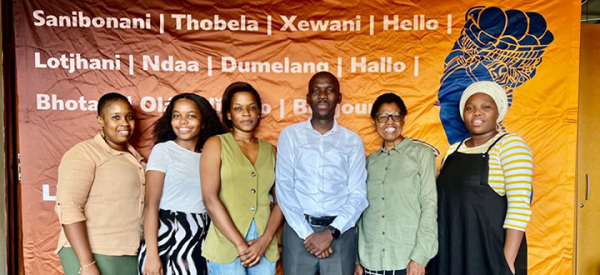College of Human Sciences
Unisa linguists participate in the 2025 AFLC
The Department of Linguistics and Modern Languages in the College of Human Sciences, in collaboration with the engaged scholarship project Skills Training for Editors and Translators, had the privilege of taking part in an online panel discussion as part of the African Languages Conference (AFLC) 2025.

From left: Neliswa Mzimba, Karabo Mafetsa, Dr Dakalo Takalani, Dr Kganathi Shaku, Dr Bulelwa Nokele and Rachel Maboa
The purpose of the AFLC is to promote and preserve Africa’s rich linguistic heritage in a world where languages are increasingly endangered. It has grown into a powerful platform for highlighting the critical role of African languages in shaping the continent’s development.
Unisa’s Skills Training for Editors and Translators was established in 2016 to enhance translators’ competences in the workplace. The project offers workshops to novice translators, freelancers government employees, professional translators and editors in all provinces in South Africa. Since its inception the project has reached seven provinces: KwaZulu-Natal, Limpopo, Mpumalanga, the North West, Gauteng, the Eastern Cape and the Western Cape.
Members of the project include Dr Bulelwa Nokele (project leader), Dr Feziwe Shoba, Dr Kganathi Shaku, Dr Dakalo Takalani, Dr Fiona Ferries, Karabo Mafetsa, Mmapitso Maboa, Tshilidzi Mabadzhabadzha, Florence Butedi, Zolani Kupe and Neliswa Mzimba.
The panel discussion was moderated by Dr Shaku, senior lecturer, who alongside his team did a presentation on the topic "Machine translation in language practice – the efficiency of machine translation for some of the South African indigenous languages". The presentation aimed to highlight the complex relationship that exists between machine translation (MT) and African indigenous languages by showcasing the shortfalls and advantages of machine translation.
In order to illustrate the theoretical aspects of the presentation, the panel used different machine translation tools, namely Gemini, ChatGPT, Glosbe and Google Translate, to illustrate their effectiveness when it comes to texts in Sepedi and isiXhosa.
This practical demonstration was done by Karabo Mafetsa and Neliswa Mzimba, who through a thorough analysis of the translated texts in their respective languages, spoke of how in some instances MT failed to translate proverbs, idioms, pronoun systems, figurative statements and pronominal references.
The discussion was then enriched by the insights of two language practitioners, namely Dennis Mhlanga (Xitsonga) from Johannesburg and Mapule Molatisi (Setswana) from the Setswana National Lexicography Unit at the North-West University, who shared their first-hand experiences with MT. As practitioners in the field, they are more exposed to the different machine tools, which make their insights valuable when weighing whether MT is effective or ineffective when translating into our different languages.
It then became clear that the strength of the team lay in their varied experiences in the field. The team consisted of Neliswa Mzimba, Karabo Mafetsa, Dr Dakalo Takalani, Dr Kganathi Shaku, Dr Amanda Nokele and Rachel Maboa. The team members offered varied perspectives to aid in the discussion, which served as a great foundation for translating into indigenous languages.
This proves that the human element is irreplaceable even in changing times when we need to adapt to using technology. When it comes to our indigenous languages, MT falls short as these languages carry a lot of cultural nuances and are grammatically complex. Instead, MT should be used as a complimentary tool and not as a replacement because it reproduces what is stored in its memory and as a result tends to miss the mark – the meaning gets lost between the two texts/languages.
Language practitioners, on the other hand, are able to ensure that a translation is not only accurate in terms of meaning but it is also sensitive to both cultures.
This session was an opportunity to foster personal dialogue as we live in a digital world. It also attempts to show how there can be a balance between MT and human translators to empower, preserve and promote indigenous languages in a changing world.
Shoba introduced the presentation and project whilst highlighting some shortfalls and advantages of both MT and human translation.
View the session
* By Nnana Martina Jege and Karabo Mafetsa, College of Human Sciences
Publish date: 2025/03/17

 Unisa co-hosts G20 community outreach in the Eastern Cape
Unisa co-hosts G20 community outreach in the Eastern Cape
 Unisans gain membership of prestigious science academies
Unisans gain membership of prestigious science academies
 Advocating for disability transformation through servant leadership
Advocating for disability transformation through servant leadership
 Unisa Press continues to illuminate the publishing space
Unisa Press continues to illuminate the publishing space